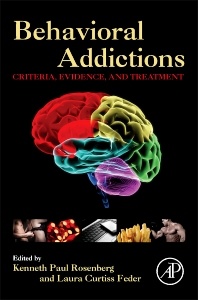Description
Behavioral Addictions
Criteria, Evidence, and Treatment
Coordinators: Rosenberg MD Kenneth Paul, Feder PsyD Laura Curtiss
Language: English
Subject for Behavioral Addictions:
Keywords
Addiction Interaction Disorder; Cybersex Addiction; DSM-5; Gambling Disorder; Hypersexual Disorder; Internet addiction; Internet addiction disorder; Love addiction; Reward/Executive Function model; Sexual Addiction; Sudarshan Kriya yoga; asanas; assessment; bariatric surgery; behavioral addiction; behavioral addictions; behavioral impulses; binge eating disorder; biopsychosocial model; body mass index; children of sex addicts; co-morbidity; cognitive behavioral therapy; cognitive motivational behavior therapy; comorbidity; compulsive buying disorder; compulsivity; cue-exposure; divorce; epidemiology; epigenetics; etiology; expert witness; family therapy; food addiction; genetics; imaginal desensitization; impulse control disorder; impulsivity; infidelity; kleptomania; law; lawsuit; legal issues; leptin insufficiency syndrome; mindfulness-based meditation; motivation; motivational interviewing; negative addiction; negative consequences; neurobiology; neuroscience research; obesity; obsessive-compulsive disorder; online games; online gaming addiction; partners; pharmacotherapy; prevalence; primary and secondary exercise addiction; problematic Internet use; problematic online gaming; psychiatric comorbidity; psychological underpinnings; psychosocial dysfunction; rejection addiction; resignation; reward deficiency syndrome; romantic rejection; sex addiction; sex addiction therapy; shopping; social factors; social network addiction; social networking sites; societal issues; spouses; substance addiction; transcendental meditation; treatment; yoga
416 p. · 15x22.8 cm · Hardback
Description
/li>Contents
/li>Readership
/li>Biography
/li>Comment
/li>
2. Behavioral Addiction: The Nexus of Impulsivity and Compulsivity
3. Diagnosis and Treatment of Gambling Disorder
4. Problematic Online Gaming
5. Internet Addiction Disorder: Overview and Controversies
6. Social Networking Addiction: An Overview of Preliminary Findings
7. Food Addiction: Evidence, Evaluation, and Treatment
8. New Directions in the Pharmacological Treatment of Food Addiction, Overeating, and Obesity
9. Sex Addiction: An Overview
10. The Tyranny of Love: Love Addiction - An Anthropologist's View
11. Picking Up the Pieces: Helping Partners and Family Members Survive the Impact of Sex Addiction
12. Compulsive Buying Disorder
13. Exercise Addiction
14. Meditation and Spirituality-Based Approaches for Addiction
15. Behavioral Addiction in American Law: The Future and the Expert's Role
Clinical psychologists in research and practice, psychiatrists, medical doctors, nursing and medical students, and clinicians of all types including social workers. Suitable as an academic textbook or reference work.
Dr. Rosenberg is a contributing editor of the Journal of Sex Therapy, the author of scientific and lay articles, listed among the Best Doctors® in America and New York Magazine’s Best Doctors, a Distinguished Fellow of the American Psychiatric Association and the recipient of medical and public service awards from the American Medical Association, American Psychiatric Association and the Alliance for the Mentally Ill.
Since medical school, Dr. Rosenberg has produced and directed films that have been aired on HBO and PBS affiliates and have been recognized by the Academy for Television Arts and Sciences, the Academy for Motion Picture Arts and Sciences, the American Museum of Natural History and numerous film festivals. He is a recipient of the George Foster Peabody Award. His films include An Alzheimer’s Story (coproducer/director, PBS affiliates 1985), Through Madness: The Subjective Experience of Psychosis (producer/director, PBS Affiliates, 1991) Why Am I Gay?: Stories of Coming Out in America, (producer/director, HBO, 1993) Back From Madness (producer/director, HBO.1996), Drinking Apart: Families Living Under the Influence, (producer/director/cinematographer, HBO, 2000) and Cancer (executive producer, HBO,2000) and in producing a current HBO-commissioned project on mental illness in America. http://www.imdb.com/name/nm0742255/
Laura Curtiss Feder, PsyD is a licensed clinical psychologist at Upper East Health. Her psychotherapy practice is geared toward working with adolescents and adults, particularly those who struggle with behavioral addictions and compulsions. Dr. Feder received an undergraduate degree i
- A guide to understanding the new DSM-V designation of behavioral addiction
- Defines the criteria for behavior to be considered an addiction designation
- Discusses the evidence for behaviors meeting addiction criteria
- Identifies what is now, likely will be, and is not a behavioral addiction per evidence
- Discusses behaviors formerly considered impulse control disorders
- Presents evidence-based treatment for each behavioral addiction




